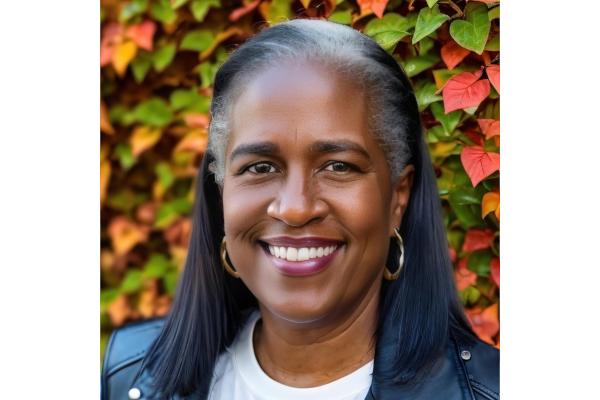Robin Harris
National Humanities Medal
2022

—Bethany Versoy

—Bethany Versoy
“We are not tourists; we are travelers,” Robin Harris often reminds students embarking out into the world. Of the many lessons Harris has imparted over her 40 years as an educator, this one may best epitomize her own professional journey. A dynamic problem solver, she has built bridges between schools and communities in cities from Dallas, Texas, to Cambridge, Massachusetts. In the process, she has broadened the worlds of countless students and expanded the bounds of what educators can achieve in and outside the classroom.
The story Harris has written throughout her career—student by student, classroom by classroom—speaks to the transformative power of community engagement.
This story first began in Cambridge, where Harris, a fifth-generation resident, grew up steeped in the area’s rich history and her family’s deep commitment to the humanities. At home, each of the Harris children studied music, foreign languages, and literature. Outside their door, they engaged in community, surrounded by generations of African American families and leaders in their tight-knit neighborhood known as “The Coast.”
From an early age, Harris excelled at social studies, chess, geography, reading—Nancy Drew mysteries always a favorite—and puzzles, drawn even then to problem-solving. Her father’s career in the United States Air Force often brought the family to new places. They spent time stateside in Wyoming and Oregon and overseas in the United Kingdom and Turkey. These formative travels, she says, sparked an insatiable curiosity about the world and an imaginative empathy for others.
“Wherever we were, our mother wanted us to be able to break bread with a king or a person on the street—the whole gamut of humanity,” recalls Harris. That ability to connect with others, regardless of their background or differences, quickly became one of the hallmarks of her career as an educator.
Harris always knew her destiny was in the classroom. “I recognized early the power of teachers to unleash freedoms, build curiosity, and make kids the owners of their own learning,” she says. She earned a BA in elementary education, an MEd in special education, and completed postgraduate work in educational administration. She began as an elementary school teacher in 1984, working in Massachusetts districts and later in Texas before returning to her hometown.
During a 20-year tenure as principal of Fletcher Maynard Academy, a Cambridge public elementary school, Harris initiated and led student trips to Senegal, India, Morocco, England, and beyond. Echoing her own formative exposure to travel, students visited local schools and engaged in communities abroad as fellow travelers in humanity, not just tourists confined to the beaten paths of museums.
“I wanted to make sure my students understood that the world is filled with wonderful, beautiful people,” Harris says, “and when you get to know people—really get to know them—you can understand what’s important to them and resolve conflicts together.”
A tireless advocate for students, Harris fostered a “co-ownership” model with families and teachers in her school, helping to improve student academic outcomes and teacher retention. She spearheaded home visits for students to better engage families, prompting adoption of similar policies districtwide.
Her advice to current and aspiring educators: “You need to know your students, and you need to know their families.”
In many ways, Harris’s innovations in education embody the words of Civil Rights activist and founder of Children’s Defense Fund, Marian Wright Edelman: “We must not, in trying to think about how we can make a big difference, ignore the small daily differences we can make.”
The impacts of Harris’s on-the-ground efforts reach far beyond one school. She devotes much of her work to dismantling barriers to academic success and social well-being for those who have been marginalized or underserved, embodying a commitment to equity and engagement. As principal, Harris hosted “Courageous Conversations,” an open-dialog series engaging families and educators in practical approaches to supporting equity and disrupting racism.
Throughout her career, Harris has witnessed the unique and systemic educational challenges faced by male students of color. In response, she launched Qualls Academy, focused on improving the academic achievement, self-esteem, and social competence of young men of color through mentorship and targeted programming.
Her tangible impact on educational outcomes, coupled with the immeasurable effects she has had on her students underscore Harris’s belief that centering policies on marginalized groups leads to rising tides for all. In 2006, Harris helped lead efforts for the Massachusetts Expanded Learning Time initiative, the first statewide effort to lengthen the school day and better support student needs. The following year, Harris presented data from the school’s participation in the initiative as part of a national educational conference hosted by the late United States senator from Massachusetts, Edward Kennedy, in Washington, D.C.
Since retiring as principal of Fletcher Maynard Academy in 2020, Harris continues to facilitate vital discussions as a family engagement coordinator and educational consultant, advising multiple school districts. “Your work as an educator is never done,” she says and credits the humanities with continuing to inspire and shape future generations in this role.
“The arts, culture, and humanities are vital to life in America as they create spaces for all voices, especially those marginalized or on the fringe, to be seen and heard,” says Harris, “They foster critical thinking, empathy, and creativity, empowering individuals, especially our youth to make informed choices, challenge injustices, and contribute to a more equitable society.”
—Gabriella Gage